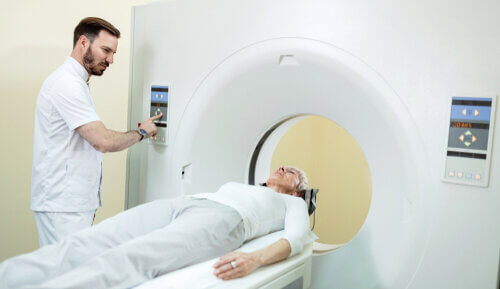Dementia affects nearly a million people in the UK. While there is currently no cure, there is a range of treatments and approaches that can slow the progression of symptoms, improve a person’s quality of life, and provide vital support for both those living with dementia and their carers

Page contents
- At a glance
- Is there a cure for dementia?
- Disease-modifying treatments: Anti-amyloid drugs
- Anti-dementia treatments (available on the NHS)
- Combination dementia treatments
- Medication for behavioural symptoms
- Dementia sedative Risperidone linked to strokes
- Medication reminders
- Therapies that support dementia care
- Lifestyle changes
- Emerging and experimental dementia treatments
- Is dementia treatment free?
- FAQs
Page contents
- At a glance
- Is there a cure for dementia?
- Disease-modifying treatments: Anti-amyloid drugs
- Anti-dementia treatments (available on the NHS)
- Combination dementia treatments
- Medication for behavioural symptoms
- Dementia sedative Risperidone linked to strokes
- Medication reminders
- Therapies that support dementia care
- Lifestyle changes
- Emerging and experimental dementia treatments
- Is dementia treatment free?
- FAQs
At a glance
- No cure yet – but dementia treatments can slow progression of the disease and help to manage symptoms
- Anti-amyloid drugs (donanemab & lecanemab) are approved in the UK but are not available on the NHS
- Four main anti-dementia drugs (donepezil, rivastigmine, galantamine, memantine) are available on the NHS
- Therapies and lifestyle changes – including Cognitive Stimulation Therapy, exercise, and diet can play a key role
Is there a cure for dementia?
Dementia is a term for a group of progressive neurological conditions that affect memory, thinking, and behaviour. There is no cure for dementia.
After diagnosis, the person should be given a plan for their care and support
Currently treatment is focussed on:
- Slowing disease progression with disease-modifying drugs.
- Managing cognitive and behavioural symptoms (combining medication + therapy)
- Improving independence and quality of life
Today, people living with the disease dementia can take certain medications that will boost memory and help someone to function better in daily life.
Therapies and lifestyle changes can also ease symptoms and improve quality of life.
Disease-modifying treatments: Anti-amyloid drugs
Two anti-amyloid drugs – donanemab and lecanemab have been approved as dementia treatments in the UK. They work by targeting amyloid plaques in the brain, a hallmark of Alzheimer’s disease.
They are not available on the NHS as they do not pass the threshold for being cost effective. So they are only available to people who are able to pay privately.
Lecanemab was rejected by the National Institute for Health and Care Excellence (NICE) for use on the NHS in England and Wales in 2024.
In February 2025, the Scottish Medicines Consortium (SMC) turned down Lecanemab, which costs £60,000 a year, for use in Scotland.
The treatment’s costs were viewed as too high and the evidence backing the drug wasn’t strong enough.
Hilary Evans-Newton, chief executive at Alzheimer’s Research UK, called it a “heartbreaking setback” for people with early-stage Alzheimer’s disease.
She said: “Like first-generation treatments for other diseases, lecanemab has modest benefits and side effects that need careful monitoring. But it can offer people with early-stage Alzheimer’s the chance to slow down this devastating disease and that’s a chance they deserve.”
Donanemab and lecanemab both target amyloid plaques in the brain.
Lecanemab is given as an intravenous (IV) infusion, or drip, into a vein, typically over about one hour, every two weeks.
Donanemab is also given intravenously, taking about 30 minutes, every four weeks.
Both can have “dire side effects”, according to Dr Nori Graham, former Chairperson of Alzheimer’s Disease International and Alzheimer’s Society and Fellow of the Royal College of Psychiatrists. These side effects are brain swelling and bleeds on the brain.
Anti-dementia treatments (available on the NHS)
These medications slow memory loss, reduce anxiety, boost alertness, and support daily functioning.
Cholinesterase Inhibitors
These medicines stop an enzyme from breaking down acetylcholine in the brain, a neurotransmitter which helps nerve cells to communicate with each other.
Cholinesterase inhibitors tend to be prescribed for people living with early to middle stage dementia. They seem to be most effective in the first six to 12 months of taking the medication.
| Drug | Brand | Best For | Benefits |
| Donepezil | Aricept | All stages of Alzheimer’s, Dementia with Lewy bodies, Parkinson’s disease dementia | Improves memory and daily function; cheapest and recommended first |
| Rivastigmine | Exelon | Alzheimer’s, Parkinson’s-related dementia | Good option for hallucinations |
| Galantamine | Reminyl | Mild–moderate Alzheimer’s | Boosts motivation and concentration |
Dr Nori Graham warns that although Aricept can “help people to function and can slow progress of the disease down for a while, it only works for some people”.
Common side effects of these drugs include: Nausea, diarrhoea, loss of appetite, headaches, muscle cramps, dizziness and being unable to sleep at night.
NMDA Receptor Antagonists
Memantine (Ebixa, Marixino, Valios)
Memantine is good for people who are unable to tolerate or cannot take acetylcholinesterase inhibitors. This is because they can suffer bad side effects or due to a medical condition.
- Protects brain cells from glutamate damage
- Is prescribed for moderate to severe Alzheimer’s
- Can reduce aggression, agitation, and delusions
- Can be combined with a cholinesterase inhibitor for added benefit
Dr Nori Graham has found that memantine can really help some people with dementia who are suffering from anxiety.
Common side effects: Headaches, dizziness, raised blood pressure and constipation. Bear in mind that these do tend to be temporary.
Combination dementia treatments
A study in 2024 found the combined use of Donepezil and Memantine significantly increased the probability of a person living for five years. This was compared to if the person took no medication or took just Donepezil or just Memantine.
Some patients also benefit from galantamine + memantine to reduce anxiety. This drug combination can also improve thinking ability and behaviour.
Men and women can experience medicine combinations differently. So this needs to be taken into consideration.
Medication for behavioural symptoms
As the disease progresses, people may experience agitation, aggression, hallucinations, and delusions.
Dementia treatment may include:
- Antidepressants: sertraline, trazodone, mirtazapine (watch for citalopram side effects)
- Antipsychotics: risperidone (short-term not more than six weeks, monitored use), haloperidol (this should be a last resort due to the risk of stroke)
- Anticonvulsants: occasionally used for aggressive behaviour but with limited evidence
A consultant psychiatrist must ideally prescribe any medication that is given for behavioural symptoms. They must also check the person regularly to reduce any risks.
Dr Nori Graham advises that if there are any changes in behaviour, drugs are not always the answer. She says: “Medication for behaviour should be used very cautiously and in small amounts.
“It is important to look at the reasons for the behaviour and why they are behaving like that. Is it because they are hot or cold or hungry? We need to look at reasons, rather than simply medicating people with dementia.”
Dementia sedative Risperidone linked to strokes
A study of over 165,000 people living with dementia in the UK published in October 2025 found Risperidone increases the risk of stroke, and no one was exempt from the risk.
This anti-psychotic drug is commonly used to treat people with dementia who are experiencing severe agitation, especially in care homes where other strategies and techniques have failed.
Researchers found stroke risk among people with dementia taking Risperidone increased even in people who had no history of heart disease or stroke.
The findings were published in the British Journal of Psychiatry.
“We knew Risperidone causes stroke, but we didn’t know whether some groups of people might be more at risk than others. We thought if we might identify characteristics that make people more at risk, doctors could avoid prescribing to patients with those characteristics,” said Dr Byron Creese from the College of Health, Medicine and Life Sciences at Brunel University of London.
50% of people with dementia can suffer from agitation
Fifty per cent of people with dementia experience agitation, often causing severe distress. When non-drug treatments don’t work, doctors can turn to Risperidone as a last resort.
NHS guidelines limit Risperidone use to six weeks for severe symptoms, but many people do take it for longer.
Dr Creese added: “These findings give clearer information about who is most at risk, which helps everyone make more informed choices. Every decision should be based on what is right for each person, through honest conversations between doctors, patients, and families.
“We hope that these data can be used in updated guidance that is more person centred and based on particular patient characteristics.”
The research team looked at anonymised NHS records between 2004 and 2023, and compared people prescribed Risperidone with ‘matched controls’ who were not. In people with a history of stroke, the annual rate per 1000 people jumped to 22.2 per cent on Risperidone, compared with 17.7 per cent in those not taking it.
In people who had not had a stroke, the rates were lower but still significant – 2.9 per cent versus 2.2 per cent.
Medication reminders
Managing medication can be tricky and people with dementia may need support to help them remember to take the right dose at the right time.
Useful devices for reminders include:
- visual reminders like a wall chart
- a pill organiser with compartments for times and days
- alarms or alerts on a mobile
- smart speakers
- smartphone apps
Therapies that support dementia care
| Therapy | How it helps |
| Cognitive Stimulation Therapy (CST) | Group activities improve memory, problem-solving |
| Reminiscence Therapy | Uses music, photos, and stories to improve mood & communication |
| Occupational Therapy | Maintains independence and adapts the home environment to reduce confusion and hazards |
| Physical Exercise | Improves mood and may slow decline |
| Social Interaction | Reduces isolation and supports mental health |
Care homes use a whole range of therapies for people with dementia from dementia dolls to animal therapy. You can read more about the dementia therapies available in care homes in our article Dementia therapies in care homes: Types and benefits.
Lifestyle changes
- Diet: A Mediterranean or MIND (Mediterranean-DASH Intervention for Neurodegenerative Delay) diet supports brain health. This type of diet is a plant-based diet which is rich in leafy greens, berries, nuts, whole grains, fish, and olive oil.
- Sleep: A good sleep helps reduce confusion and anxiety
- Mental stimulation: Puzzles, reading, and learning new skills can keep the brain active
Emerging and experimental dementia treatments
| Approach | Goal |
| Anti-Tau treatments | Target tau protein tangles (under clinical trial) |
| Immunotherapy | Enhance immune system to clear toxic proteins |
| Gene therapy and stem cells | Repair or replace damaged neurons |
| Digital and VR therapies | Brain training, neurofeedback, cognitive tracking |
These are still in their research phases but they may be able to transform dementia care in the coming decade.
Is dementia treatment free?
Yes – if the dementia treatments have been prescribed on the NHS:
- England: Free for those aged 60+ or for those who are exempt
- Scotland, Wales, NI: All prescriptions are free
FAQs
Is there a cure for dementia?
Currently there is no cure for dementia. But there are many dementia treatments and drugs in the pipeline.
Are dementia treatments free on the NHS?
There are four dementia treatments that are free on the NHS. There are donepezil, rivastigmine, galantamine, memantine. You may have to pay for the prescription depending on your age and where you live in the UK.
What are disease-modifying drugs?
Two anti-amyloid drugs – donanemab and lecanemab have been approved as dementia treatments in the UK. They work by targeting amyloid plaques in the brain, a hallmark of Alzheimer’s disease.
They are not available on the NHS as they do not pass the threshold for being cost effective.


